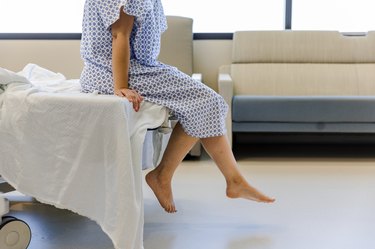
When you're someone who has a period, you can get used to all sorts of wonky stuff happening with your cycle.
Like the time you missed a period and freaked out because you thought you were pregnant. Or when you had such bad cramps you stayed in on a Friday night instead of going out with your friends to a cool new restaurant in town.
Video of the Day
Video of the Day
Or maybe your flow was so heavy one time you bled through your jeans and had to walk around school with a coat tied around your waist. (Or was that just me?)
Over the years, you've learned to expect the unexpected. But while your menstrual cycle can be completely annoying and ill-timed, it shouldn't be a source of agony.
Symptoms like extreme heavy bleeding, long-lasting cramping or painful sex are all not normal — and you deserve to be listened to, cared for and have your symptoms investigated to determine if something more is going on.
Here are the symptoms gynecologists listen for, and tips on when to get help.
1. Cramping, Painful Periods
Cramping during your period is common. In fact, more than half of people with periods have menstrual pain for a day or two in their cycle, according to the American College of Obstetricians and Gynecologists (ACOG).
It's all part of your biology — your uterine lining releases hormones called prostaglandins that cause uterine contractions (aka, cramping), which help the bleeding process along, per ACOG.
Your levels of prostaglandins are typically highest on the first day of your period, which is why the start of your period can be particularly painful.
But you shouldn't expect this pain and cramping to feel unbearable or linger through your entire cycle. "This is a big red flag for endometriosis," says Jaime Seeman, MD, a board-certified ob-gyn.
Endometriosis is a condition where tissue similar to your uterine lining grows outside of your uterus. It affects more than 11 percent of menstruating people between ages 15 and 44, but most especially affects people in their 30s and 40s, per the Office on Women's Health.
Other potential reasons for extremely painful periods include fibroids (growths that form on your uterus), adenomyosis (uterine lining that grows into the muscle of the uterus) or GI issues like Crohn's disease — a type of inflammatory bowel disease (IBD), ACOG says.
In addition to bad cramping that lasts throughout your cycle, you should also pay attention to how these painful periods are disrupting your life, Dr. Seeman says.
"I'll ask patients if they're having to miss school, work or activities they typically enjoy. Pain at a level where you don't feel comfortable leaving the house is concerning," she adds.
2. Heavy Vaginal Bleeding
"Describing unhealthy menstrual bleeding is subjective," Dr. Seeman says.
But it can generally be defined by bleeding through a "regular"-absorbency tampon or pad every one to two hours. "These products are designed to last at least four hours for most people," she says.
And products like menstrual cups have the ability to hold 12 hours' worth of blood.
If you're soaking through a tampon after an hour or filling a cup after just a few hours have gone by, you'll want to talk to your doctor.
ACOG also says if your bleeding lasts more than seven days, you have to change your tampon or pad during the night or are regularly passing blood clots at least the size of a quarter, you should get checked out.
Abnormal heavy bleeding can be a sign of many different issues, including fibroids and polyps, endometriosis or, in rare cases, endometrial cancer, according to ACOG.
Endometrial cancer is most often diagnosed in people with uteruses around age 65. That said, rates of the cancer have increased, and it's being diagnosed in younger people, according to a March 2020 issue of the International Journal of Gynecological Cancer. Fifteen percent of cases are in people younger than 50, and 5 percent are in those younger than 40.
Risk factors for endometrial cancer include obesity, never having given birth, irregular periods and diabetes. The main symptom is typically unusual vaginal bleeding, per the American Cancer Society.
If you're unsure whether your bleeding is normal, don't be afraid to ask your doctor. They can conduct tests like ultrasounds to investigate.
Tip
Keep in mind that some birth control options, such as the intrauterine device (IUD) and the Depo-Provera shot, can cause light spotting and bleeding between periods. They can also cause heavier menstrual bleeding (if you're using an option where you still get your period), per the University of Colorado. Talk to your doctor about what to expect while using these methods, and report any symptoms that are different from your "normal."
3. Irregular Vaginal Bleeding
Speaking of irregular bleeding, if your period typically comes like clockwork but is mysteriously late or missing for a month, there are so many things that could be going on.
"Changes in one's weight, medications, stress or even forgetting to take a hormonal birth control pill can cause bleeding outside of the menstrual cycle," Dr. Seeman says. If you know what happened — let's say you know you missed a pill, for example — then you may have no need for concern.
However, if you can't suss out the source of your wonky cycle and you're having other reproductive health symptoms (such as those on this list), then something else may be at play. These symptoms can be signs of pregnancy, endometriosis or fibroids, and it's best that you get checked out.
Your doctor may do a Pap smear test, a pelvic exam or even an ultrasound to determine what's going on.
4. Pelvic Pain

Another symptom that can be a red flag is pelvic pain that happens outside your typical menstrual cycle. While you can have pelvic pain after exercising, for example, there are other reproductive-based reasons you could have pain.
One "normal" time this pain can pop up is during ovulation, Dr. Seeman says. At the time when an egg is released, you may have some mild pain that lasts for an hour or two, she says.
But if your pelvic pain is not tied to ovulation, mild in nature or short-lived, then your doctor might want to check for other uterine or ovarian issues, such as endometriosis, fibroids or polyps.
Another thing: If you're having GI symptoms too, such as constipation or diarrhea, then you may be referred to a gastroenterologist to rule out inflammatory bowel disease, or IBD. (Your pain could actually be bowel spasms, Dr. Seeman says.)
Other diseases that can cause pelvic pain are urinary tract infections and, in rarer cases, ovarian or endometrial cancer, Dr. Seeman says.
Is It Ovarian Cancer?
Ovarian cancer is often missed or misdiagnosed because there's no regular screening for it, and its symptoms often mimic other reproductive or GI issues. In fact, only about 20 percent of ovarian cancers are caught at an early stage, per UCLA Health.
Risk factors for ovarian cancer include endometriosis, having overweight or obesity, a family history of ovarian cancer or taking hormone therapy for menopause, per UCLA Health. Getting older also increases your risk — the highest rates of ovarian cancer are in people ages 55 to 64.
If you notice any changes in your abdomen (bloating), pelvic pain (particularly on one side), diarrhea, constipation and irregular bleeding, talk to your doctor. They might want to order a transvaginal ultrasound to look for ovarian abnormalities.
5. Pain During Intercourse
"Sex should not hurt," Dr. Seeman says.
It's one thing to be in an uncomfortable penetrative position and switch things up to feel better, and then go about having intercourse. But it's another to experience consistent pain during penetrative sex.
When that happens, you may feel frustrated and avoid that type of sex (or sex in general) altogether.
"When patients have pain during intercourse, I think about a variety of things," Dr. Seeman says. Endometriosis, fibroids, infection or problems with the pelvic floor can all be a potential source of the pain.
There is also a mental component of sexual activity that is really important to consider. If you have a vagina, a condition called vaginismus (spasms of the muscles of the vagina) or vulvodynia (vulvar pain without a known cause) may also be at play, says ACOG.
For these types of issues, it could even help to speak with a licensed therapist or sex therapist to help unpack any unwelcome feelings.
Tip
Talk to your doctor about any pain you experience during sex, whether it's caused by a physical or emotional issue. They can start by examining your reproductive organs to make sure you don't have any structural issues getting in the way. If not, they can dive deeper into other possible causes.
6. Bleeding After Sex
Just like you shouldn't expect pain during sex, you shouldn't expect to bleed after sex, either.
(That is, unless it's your first time participating in penetrative sex. In that case, light bleeding afterward is common, per Planned Parenthood. Light bleeding after sex is also somewhat common during pregnancy because of changes in the cervix, per the American Pregnancy Association, and it can also happen if you have a vaginal infection, like a yeast infection.)
Otherwise, Dr. Seeman says bleeding could be from an endometrial or cervical polyp.
These types of growths are common and are often benign. They can grow on the uterus or cervix and contain blood vessels, which can lead to light bleeding with sex. They can also cause irregular bleeding between periods, per Mount Sinai.
Polyps can actually be removed by your gynecologist in their office, often with a gentle tug during a pelvic exam. From there, the polyp can be sent to a lab for further testing to determine if it's abnormal (which is rare), per Mount Sinai.
Rarely, bleeding after sex could be an early sign of cervical cancer, according to the National Cancer Institute. Other symptoms might include pain during sex, bleeding between periods or periods that are heavier or longer than normal and watery discharge with a strong odor.
When to See Your Doctor
While it may feel tempting to try to diagnose your reproductive health issue by searching online, it's important to see your gynecologist whenever abnormal symptoms appear.
"[Social media] is not a substitute for a conversation with your provider," Dr. Seeman says.
Even if the topic feels difficult or embarrassing, know that your doctor discusses these symptoms all the time; they will not be taken aback.
That said, the above all describe potential red flag reproductive health symptoms. If you're noticing any of these, make an appointment to get checked out. It's the first step toward identifying the (potential) problem, being treated and feeling better in the future.
- The American College of Obstetricians and Gynecologists: "Dysmenorrhea: Painful Periods."
- Office on Women's Health: "Endometriosis."
- The American College of Obstetricians and Gynecologists: "Heavy Menstrual Bleeding."
- American Cancer Society: "Signs and Symptoms of Endometrial Cancer."
- The American College of Obstetricians and Gynecologists: "When Sex Is Painful."
- Patients Like Me: "Health Information: What Sources Do People Trust?"
- University of Colorado: "Heavy Periods & Birth Control"
- International Journal of Gynecological Cancer: "Endometrial cancer in young women: prognostic factors and treatment outcomes in women aged ≤40 years"
- UCLA Health: "How is ovarian cancer detected?"
- Planned Parenthood: "Will I Bleed the First Time I Have Sex?"
- Mount Sinai: "Cervical Polyps"
- American Pregnancy Association: "Bleeding During Pregnancy"
- National Cancer Institute: "Cervical Cancer Symptoms"
Is this an emergency? If you are experiencing serious medical symptoms, please see the National Library of Medicine’s list of signs you need emergency medical attention or call 911.


